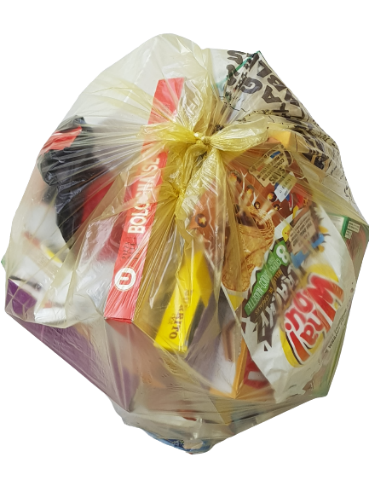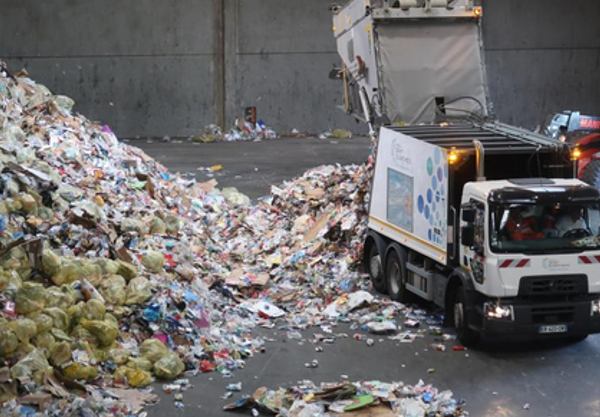

WIZARDWORDS 3.0
RECYCLING IS A LIE AND EVERYONE KNEW IT.
This next edition of the WIZARDWORDS looks at recycling and what role it will play in the solutions for the future of the plastic waste crisis.
Before we get into it, some news of the day. 28 April 2022
Attorney General GETS TOUGH ON PLASTIC PRODUCERS
 “Attorney General Rob Bonta (California US) said: "For more than half a century, the plastics industry has engaged in an aggressive campaign to deceive the public, perpetuating a myth that recycling can solve the plastics crisis," Bonta said. "The truth is: The vast majority of plastic cannot be recycled."
“Attorney General Rob Bonta (California US) said: "For more than half a century, the plastics industry has engaged in an aggressive campaign to deceive the public, perpetuating a myth that recycling can solve the plastics crisis," Bonta said. "The truth is: The vast majority of plastic cannot be recycled."
The announcement cited NPR and the PBS series Frontline's 2020 investigation into the oil and gas industry which uncovered documents showing top officials knew that recycling plastic was unlikely to work but spent tens of millions of dollars telling the public the opposite. Starting in the 1980s, the industry launched dozens of ads, nonprofits, and campaigns touting the benefits of recycling plastic – and placing the responsibility on consumers – even as their own documents warned that recycling was "infeasible" and that there was "serious doubt" that plastic recycling "can ever be made viable on an economic basis," the investigation found.”
https://text.npr.org/1095305949
Gosh, you mean that the recycling thing was all a lie?
How could they lie to us - When did this all begin?
Not exactly, but in general yes, recycling is not a ‘complete solution’.
This view is amplified by many respected sources; “..plastic recycling has never lived up to the promises made by the plastics and products industries, and it never will. These facts show that the only thing the plastics and products companies have successfully recycled are their failed promises on plastic recycling. ” (ed. The Real Truth About the U.S. Plastic Recycling Rate: 2021 U.S. Facts and Figures May 4, 2022 Last Beach Cleanup) https://www.lastbeachcleanup.org/_files/ugd/dba7d7_5ae55cdb66d241239e8ae123c96ec9b8.pdf
For decades successive attempts have been made to try to take some advantage of the special characteristics of most all plastics (thermoplastics, but not thermosetting plastics)- they can be melted and reformed into something else. It’s a special feature which should provide us with the possibility to reuse this material a multitude of times – unfortunately, it’s a lot more complicated than that.
Most plastics can theoretically be reconstituted into something else, however it’s another matter entirely to do it in practice at scale- that is the issue. The first and most obvious problem is that there are different sources where plastic waste must be collected, ranging from; post-industrial, post-domestic, post-commercial, post-agricultural. Each of these have their own challenges when it comes to collecting and reusing the material.
The first source (post-industrial) is usually not regarded as recycling as what’s left over from production generally goes back into the process, so that’s out of this discussion. For the rest, it should be clear that collection is complex exercise. It’s also clear because of this complexity, that the statement above from the AG is correct in a number of ways and these reasons should become immediately obvious. Before we begin, it's important to stipulate that when referring to ‘recycling’ it means to reuse materials as new products and excludes so-called ‘energy recovery’, ‘repolymerization’ as well as incineration and landfill which are not recycling, nor circular, nor any derivative of this idea.
Are we talking millions here ... or billions ...?
The number of products made from plastic numbers in the 100,000s perhaps millions, (Pan-Europeans amounting to +60 million tonnes/year) there is really no way to know for sure how many, and each of these products has their own specific characteristics – they are all different. Whereas to be effective, a system of reprocessing must deal with as few variations as possible between the elements going through the process. So clearly there is an obvious problem with this conception.
The first task in this process is to collect and sort a large volume of the same type of product/material for example, a water bottle. These are commonly and successfully re-processed because: they are high value; there are a lot of them (over 300 million per day); they are easy to identify; and to separate from other products. By and large, most all water bottles are composed of PET but with some other materials included such as the screw-top, a label held on by glue, and then there is contamination from product residual- in this case, water.
Once the various other parts have been removed/extracted, the remaining PET is shredded and granulated to be made into something else, but not another water bottle (it’s not circular). Without going into details, to scale reprocessing even for a simple water bottle made into something else, collection (currently not more than 40%) is by far the main roadblock.
The myriad of other forms and shapes of packaging present significantly greater challenges so totals are much lower (less than 20%). Re-processing is vastly more complicated and expensive these other plastic products because of factors such as: different materials, different polymers, contamination, and insufficient volume of specific products in the collected waste stream, to name just a few.
|
EREMA - reprocessor granulator |
Throughout the last 70 years, technology has made incremental improvements to reprocessing but the fundamentals are still the same: Collection; sorting; grinding; washing; granulating; and then, reforming into a new product. These process steps are getting better and better and also more expensive to install and maintain.
For each 1000 tonnes to be processed, an upfront investment of at least €1m is required just for the processing equipment. This doesn’t even include land, building, infrastructure, labour or operational costs. It means that for every 1000 tonnes of waste collected, someone needs to risk €1m to buy the machines and hope that someday they get a return on their investment., By this formula, the 43 million tonnes/year of plastic packaging in the Pan-European case, would require €43 billion in such investment. So far no one is offering up this sum to deal with today’s waste - and in the next decade it’s previewed to be a lot more.
So far Pan-European recycling capacity totals around 1 million tonnes/year despite the declarations of many Governments and the EC that it is a priority to increase this ‘recycling’ but they’ll not commit the funds required to do it. It's left to the private sector who seem to have little appetite to go there in any serious way, mainly because there is little or no return and an abundance of risk.
Did someone say Trillions of EUROS …
 The reasons that Governments are shy to invest despite their rhetoric could be numerous, but certainly large amongst them, is that funding processing capability is not all that there is to pay – it's also necessary to collect sufficient material to feed this capacity and herein lies the rub.
The reasons that Governments are shy to invest despite their rhetoric could be numerous, but certainly large amongst them, is that funding processing capability is not all that there is to pay – it's also necessary to collect sufficient material to feed this capacity and herein lies the rub.
In France, waste collection is overseen by CITEO, who empower Municipal governments to engage curbside collections much like all other European countries in some form or another. Households across Europe collect their packaging and regularly (every week) leave their discarded packaging mixed together on the curb for collection by truck, which makes the circuit of all addresses in their territory and dispatches the contents at a Collection and Sorting Centre.
 The volumes collected vary from house to house but on average, waste plastic comprises something like 1 kg of packaging/address/week.
The volumes collected vary from house to house but on average, waste plastic comprises something like 1 kg of packaging/address/week.
 The capacity (by volume) of these trucks enables something like 750 of these collections per load, amounting to less than 0.75 tonnes of mixed packaging in a vehicle capable of carrying 18tonnes. Putting aside the cost of purchasing and maintaining these trucks and the cost of labour to load, there is not enough value recovered in the plastic collected to cover the cost of diesel for the circuit, much less the ‘real cost’ of the collection. Add to that the cost of the Sorting Centre and its process and the cost to collect is considerable far exceeding its value (the sorted fractions could be sold from anywhere between €50-€400/tonne)
The capacity (by volume) of these trucks enables something like 750 of these collections per load, amounting to less than 0.75 tonnes of mixed packaging in a vehicle capable of carrying 18tonnes. Putting aside the cost of purchasing and maintaining these trucks and the cost of labour to load, there is not enough value recovered in the plastic collected to cover the cost of diesel for the circuit, much less the ‘real cost’ of the collection. Add to that the cost of the Sorting Centre and its process and the cost to collect is considerable far exceeding its value (the sorted fractions could be sold from anywhere between €50-€400/tonne)
It’s clear that the exercise is a loss-making operation but how much is this loss? Well in a recent report CITEO admits that the combination of collecting off the curbside; delivery to a centralized facility and the sorting, costs something like 1000€ per tonne of plastic collected. Now even if this material was homogeneous and the most valuable of the resin types (which it isn’t), there is already no value left to cover this cost, which at present is borne by society.
Moreover, as discussed earlier, the massive investment in the processing of this material (recycling) to absorb all of the packaging produced would then require another €43 trillion/year to collect it all Europe-wide, and then there is the cost of reprocessing it. That sum exceeds the value produced by the recovery and reuse of this material by several orders of magnitude.
Now it’s clear that this analysis is overly simplistic and doesn’t account for economies of scale and all sorts of other modifying factors. The point to be explained however, is that the current system of collection, sorting and reprocessing is so expensive that there is no business case at all to support the current volume of recycling (less than 9% of the total), there never has been and there is none to support future anticipated tonnages.
Certainly, there is little or no incentive for significant investment, particularly from private sources, to expand the volume, even if it is heavily subsidized by socializing the cost of collection already beyond the worth of the material.
But we are doing it already ...!
For those business which are actively recycling, doing their best …. we say, ‘keep going and doing what you are doing’, as it will take time to make things better and something is preferable to nothing. There are examples of successful companies in the recycling sector who have found a niche and are making a small difference despite these problems. Theirs is a difficult, dirty and risky business and it deserves all our support and best hopes for their success. We know that there can be improvements and reductions in cost to make it easier to make a profit from recycling, and this search should continue even though it’s clear that as it is, there will be no dramatic increase in volume or viability for the future.
What are we going to do … what can we do?
Going back to the opening statements of cause by the AG in California, he states that plastic producers have known about all of these issues and contradictions for many, many decades and yet to this day they continue to cry out that ‘recycling is the answer’. They go further to fund groups who spin this message which includes inventing new ways to explain it such as ‘Circular economy’ et al., but to no avail.
Nothing has changed in the basic proposition that: this enterprise cannot exist without significant subsidies from society - it cannot stand on its own merit. Recent attempts to get producers to participate in these subsidies such as Extended Producer Responsibility (EPR) schemes acknowledge that it should be up to producers to deal with their own mess after their customers have used their product.
These approaches are largely ineffective when measured against the task of reprocessing the millions and millions of tonnes of waste. For example: CITEO reports that after decades of trying, less than 28% (?) of the 4 million tonnes of plastic packaging waste collected in France are reprocessed. The total monies collected for this effort under the EPR scheme of CITEO is 750m€ and the public must provide the funds for the rest which goes some way to explain why there is not better results.
This is despite the declaration of the Prime Minister Edouard Philippe in his inaugural speech to Parliament in May 2017 that “all plastic waste will be recycled by 2025”. So now in 2022 there are still no plans to expand the collection and still no significant funds to build the capacity in France to deal with the volume. There is a similar story told across Europe and the US - no significant investment neither by government nor by industry. Why is that you ask?
Truth is that governments find that talking about this topic is popular but actually doing something about it is not, because there are other more ‘electable priorities’. Moreover, the European Parliament has also declared their allegiance to this cause and even provided grant funds to find ‘innovative solutions’ but cannot bring themselves to support anything other than more and more research. Sponsoring real innovation which could actually clear the logjam discussed above seems to be ‘outside of parameters’.
The real reason for this reticence I suspect, is that the problem is really, really hard to solve, there are multiple vested interests who like the way things are, and there is not a ‘crisis’ mindset to apply the sort of funds required. Even though it’s noticeable that such sums can magically appear, like when COVID arrived unannounced.
Are we doomed or can we be saved?
There are solutions out there, but they don’t resemble anything which exists today which clearly has nothing to offer, as has been amply proven through the performance of the last 70 years. Unless and until there is a shift toward sponsoring innovation throughout the whole value chain, there will be no change to the status quo. From Last Beach Cleanup “The estimated 5 to 6% U.S. domestic plastic recycling rate in 2021 should be a wake-up call to stop pretending that plastics recycling is a viable solution to plastic waste and pollution. It’s time to implement real solutions, including bans on single-use plastics, water refill stations, and reusable container programs for food and beverage service. “ (LBC May 2022 ibid.)
A willingness to fundamentally change the system we use particularly to distribute food and non-food products, is a first step. If this isn’t possible, then the past is prologue for the future in which: the volume of plastic, particularly from packaging increases unabated; cries for action will go on to no avail; and governments will continue to prioritize face-saving litigations to show that they are doing something; but fundamentally nothing will change, except the volume of plastic waste which grows and grows.
Truth is that currently, recycling is not a solution because it’s too expensive given the value it adds, and the value chain is unwilling to change anything. So, observers will go on arguing, consultants will go on inventing new words to spread confusion, and vested interests will make more profit at the expense of consumers. At the end of it all, everybody loses as this crisis continues to grow.
In a crisis, proliferating lies to build false hope is worse than inaction.
There is a chance to at least slow the rate of increase of the problem - so what must change and how? Next time we’ll look at some of the possibilities for fundamental change.
Posted on 2022-05-06 17:11








Comments